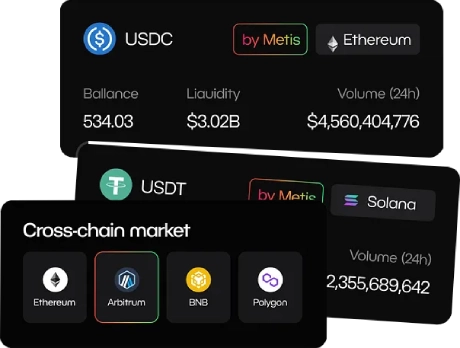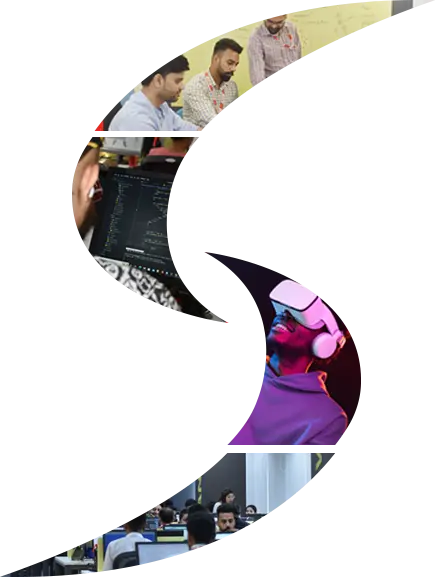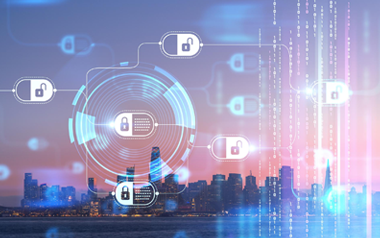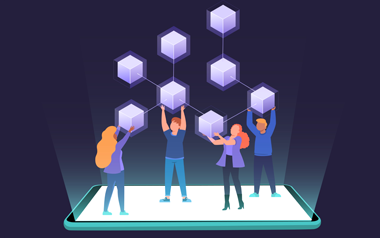dApp Development Company
Unlock your business potential with a top-tier blockchain dApp development company like us and stay ahead in the decentralized realm. Build robust and scalable decentralized apps meeting optimal transparency.
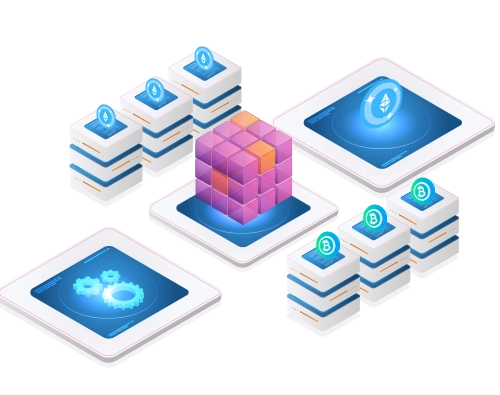
dApp Delivered
dApp Experts
Years of Experience
Satisfied Clients
With increasing demand for decentralization, early investment in dApp blockchain application development establishes businesses as industry leaders. Tap into the extensive world markets, such as DeFi and NFTs, and future-proof your business with new sources of revenue.
Stay ahead in Web3 with cutting-edge dApp development services designed for security, scale, and success. Let's build a decentralized future, together.
Being an eminent dApp development company, we specialize in developing scalable dApps, fueling innovation for businesses across various industries. Get reliable bespoke dApp development solutions, tailored to your requirements.
Whether new to dApps or refining existing ones, our dApp consulting services support you at every stage, offering insights to choose the right blockchain and unlock your project's full potential.
A smart contract is the foundation of any dApp. We create secure, efficient, and reliable smart contracts tailored to your business, ensuring seamless automation and operation.
We develop dApps that seamlessly integrate crypto wallets and payment gateways, enabling both crypto and fiat transactions and offering users multiple ways to interact with your platform.
Being a proficient dApps development company, we ensure seamless performance through continuous code testing and strict adherence to ethical coding practices.
Our team develops a decentralized finance app that lets users manage assets independently and earn passive income within the DeFi ecosystem.
Our asset tokenization services transform investing with automation and greater liquidity. Unlock new financial opportunities through custom, feature-rich tokens built to meet industry standards.
Empowers businesses to build and manage secure, immutable blockchain-based DAOs, enabling trustless fund management and seamless communication without a central authority.
Harness our DeFi yield farming solutions for transparent, accessible, and private financial inclusion. Benefit from high liquidity and earn substantial rewards based on the protocol used.
Integrate DEX software into the decentralized application to enable seamless, automated digital currency trading without intermediaries, minimizing hacks and human error.
We provide comprehensive crypto wallet development services, building secure, user-friendly wallets that integrate seamlessly with your dApp. Support multi-currency transactions and advanced security features for enhanced user experience.
Our crypto exchange development expertise enables smooth integration of trading functionalities into your dApp. Connect with leading exchanges or build custom trading interfaces for real-time market access and liquidity.
Ensure regulatory compliance with our robust KYC integration solutions. We implement secure identity verification systems that balance user privacy with compliance requirements, helping your dApp meet global regulatory standards.
Our decentralized apps help streamline processes, automate operations, perform optimized transactions, and execute user governance.
Our dApps run on decentralized networks, removing the need for central control. This ensures better security and transparency by avoiding single points of failure.
Built-in blockchain cryptography and consensus mechanisms protect user data and transactions, offering robust security than traditional apps.
Our solutions harness blockchain's potential to create new, forward-thinking business models, driving innovation across finance, healthcare, gaming, and other sectors.
Every transaction on the blockchain is recorded on a public ledger, making all activity within the dApp fully transparent and easy to audit, building user trust.
Our decentralized applications cut operational costs by eliminating intermediaries and simplifying processes with transaction fees.
Our dApps are available globally 24/7. With no central authority, users can interact with them anytime, anywhere.
We build decentralized applications with advanced features that ensure security, scalability, and exceptional user experience. Our dApps are designed to meet enterprise standards while maintaining the core principles of decentralization.
User-Friendly UI/UX Design
We design user-friendly interfaces that manages the complexity of blockchain and provide Web2-like experiences with seamless navigation. Our designs minimize learning curves and ensure users can interact with your dApp with ease, regardless of their technical expertise.
Responsive Multi-Platform Design
Effortlessly access your dApp on desktops, mobiles, and tablet devices. We ensure performance and user experience that uniforms across all platforms. It works in maximum accessibility and user engagement.
Real-Time Updates & Notifications
Allow users to stay informed with instant push notifications and live data feeds. Our notification systems deliver timely alerts about transactions, market changes, and platform activities; these enhance engagement and user retention.
Customizable Dashboards
Provide users with their own personal dashboards, themes, and options for personalization. Because of our flexible architecture, all enhancements are easily done while still upholding maximum functionality.
Multi-Layered Security Architecture
Enterprise-grade security includes end-to-end encryption, secure key management, and advanced threat protection. Our dApps solutions offers rigorous security audits to safeguard against vulnerabilities.
Multi-Signature Wallet Support
It includes an additional security layer with multi-signature transactions requiring multiple approvals for critical operations. This ensures enhanced control and reduces the risk of unauthorized fund transfers.
KYC/AML Compliance Integration
Built-in identity verification and compliance frameworks meets global regulatory standards. We implement secure KYC/AML solutions that balance user privacy with regulatory requirements.
Smart Contract Auditing
Every smart contract undergoes with the comprehensive security audits and penetration testing before deployment. It ensures code integrity and protection against exploits.
Multi-Chain & Cross-Chain Compatibility
Deploy across Ethereum, Binance Smart Chain, Polygon, Solana, Avalanche, and other leading blockchain networks. Our cross-chain solutions enable seamless asset transfers and broader ecosystem connectivity.
Scalable Architecture & Layer 2 Integration
Built to handle high transaction volumes with Layer 2 scaling solutions, sidechains, and optimized consensus mechanisms that ensure fast, cost-effective operations as your user base grows.
Decentralized Storage Solutions
IPFS, Arweave, and Filecoin integration for permanent, tamper-proof data storage. Your content remains accessible, immutable, and distributed across decentralized networks.
Gas Optimization & Fee Management
Efficient smart contract code and transaction batching strategies that minimize gas fees, making your dApp more cost-effective for users during high network congestion.
Custom Token Development
Create utility, governance, or security tokens with professional tokenomics design. We develop tokens that fit your business model and incentivize desired user behavior.
Staking & Yield Farming Mechanisms
Engage users by allowing them to earn passive income via staking pools and yield farming protocols. Our solutions include flexible reward structures and automated distribution systems.
Liquidity Pool Integration
Connect to automated market makers and liquidity pools for smooth token swaps and trading. We implement efficient liquidity management systems that enhance trading experiences.
NFT Marketplace Features
Mint, trade, and auction NFTs with complete marketplace functionalities. Multi-token standard support, including ERC-721 and ERC-1155, with royalty management for creators.
Multi-Wallet Compatibility
Support for MetaMask, WalletConnect, Coinbase Wallet, Trust Wallet, and other popular wallet solutions. Users can connect using their preferred wallet for maximum convenience.
Oracle Integration
Chainlink, Band Protocol, and other oracle services bring reliable real-world data on-chain. Enable your dApp to access external information securely for advanced functionalities.
Third-Party API & Service Integration
Seamless integration with payment gateways, exchanges, data providers, and enterprise systems. Our well-documented APIs enable easy ecosystem expansion and custom integrations.
Fiat On-Ramp/Off-Ramp Solutions
Enable users to convert between cryptocurrency and fiat currency directly within your dApp, lowering barriers to entry and improving accessibility for mainstream users.
DAO Governance Tools
Implement decentralized governance with proposal systems, voting mechanisms, and treasury management. Empower your community to participate in platform decision-making.
Automated Smart Contract Execution
Self-executing contracts that automate business logic, trigger actions based on predefined conditions, and eliminate the need for intermediaries while ensuring transparency.
Advanced Analytics & Reporting
Built-in analytics dashboards with transaction tracking, user behavior insights, and performance metrics. Make data-driven decisions to optimize your dApp's growth.
Gamification & Reward Systems
Increase user engagement with points, badges, leaderboards, and achievement systems. Create incentive structures that encourage active participation and long-term loyalty.
Our process is centered around building a workflow for timely results. We craft and implement foolproof strategies, helping businesses excel and compete in the decentralized digital landscape.
Firstly, we understand your vision and business needs. Then, our team analyzes your ideas to identify the right technologies and define the core components to create a clear roadmap.
Based on your project requirements, we identify the best blockchain technology and develop a proof of concept (POC) to get your approval before beginning the dApp development.
Based on your requirements, we help you choose the right blockchain platform (e.g., Ethereum, Hyperledger, Tezos) to build your decentralized application. Each platform offers unique features that align with different use cases.
Our team designs the dApp architecture and integrates unique features for scalable output to make your dApp user-friendly, engaging, and unique.
Our developers build your dApp in two stages: Alpha, for developing an initial version with core features, and Beta, for developing a test-ready version using real data and components like smart contracts and backend logic.
We thoroughly test smart contracts and app functionality to ensure flawless operation. Since blockchain data is immutable, we ensure zero critical errors before deployment.
After thorough testing, we deploy your dApp on the selected blockchain platform. We handle everything from porting to final deployment to ensure a smooth launch.
After release, we monitor performance and gather user feedback. We then prioritize updates, including creating new smart contracts, new features, and scalability enhancements.
The dApp development cost ranges from $10,000 to $30,000, depending on the complexity, features, and technology stack required. However, the following are some of the factors that can impact the development cost of dApps:
The requirements and complexity of an industry may be more or less expensive to develop.
The development cost will vary if your business’s dApp requires more complex features or integrations.
Custom-built decentralized applications with complex features may also be relatively more expensive.
The cost also depends on the size and experience of the dApps development company.
With the highest level of blockchain experience, business owners prefer our dApp development services for the following reasons:
Our company has deep expertise in blockchain technologies and dApp development.
Our experienced developers work exclusively on your project to achieve the best possible outcome.
We have flexible engagement models for your project needs and variable budgets.
We prefer user-friendly designs to enhance the overall experience of your decentralized application.
We deliver professional dApp development services, empowering startups, SMEs, and enterprises with innovative decentralized solutions. Have a look at what we provide:
Hire dApp developers with top-notch expertise in emerging technologies and ultramodern dApp development advancements. The team has extensive experience in developing faultless decentralized applications (dApps) for businesses of all sizes.
We have successfully finished several decentralized app development projects with a higher client satisfaction rate. Just have a peek at our portfolio to know our capabilities. We specialize in one thing and execute it really well.
We offer cost-effective solutions to businesses of different sizes while catering to their needs. Our 250+ skilled professionals are hired on an hourly, weekly, or monthly basis, helping businesses fine-tune their projects.
Discover innovative solutions for your decentralized applications. Reach out to the best dApps development company for a personalized demo of dApp services!
We utilize ultra-modern and industry-oriented tech stacks that aid in the dApp development process. The combination of futuristic technologies with top-class programming languages, including frameworks and app development tools, strengthens the platform.

Our decentralized application development services are tailored to the unique needs of various industries, driving greater user engagement and adoption.
Blockchain ensures transparency, traceability, and immutability in supply chains. Our decentralized applications enable end-to-end tracking to maintain integrity.
We build health dApps that securely manage patient records, prescriptions, and billing. Our apps protect sensitive data, ensure interoperability, and reduce fraud.
Our real estate dApps streamline property transactions by providing transparent, paperless management of titles, leases, and registries.
We develop automotive dApps for tracking vehicle history, managing supply chains, and automating ownership transfers and payments.
Our logistics dApps automate warehouse operations and delivery tracking, enabling secure, real-time data sharing for better visibility and faster transit.
Blockchain enables secure policy management and automated claims via smart contracts, improving transparency and reducing disputes.
We create decentralized fintech apps for secure P2P lending and payments, eliminating third-party dependencies and enabling innovative digital finance.
Our dApps offer decentralized identity management and authentication, safeguarding user data and enhancing security.
We build pharma dApps to combat counterfeit drugs and optimize clinical trials, ensuring transparent data reporting and consent tracking.
Our energy dApps support peer-to-peer renewable energy trading, enhancing transparency, billing, and market settlement processes.
Our DeFi dApp development services help you build secure, reliable, and scalable decentralized apps for multiple platforms.
We are a skilled blockchain dApp development company that develops versatile dApps across platforms. We stay current with industry trends to deliver advanced decentralized solutions.
Founder: Stanley Jean
I found Suffescom Solutions on Google to try for my first project, and I highly appreciate their timely response. They guided me through every step, addressed all my concerns, and ensured smooth execution. The team is professional and communicative, delivering exactly what I needed on schedule.
Founder: Denial Richard
I am extremely impressed with the Suffescom Solutions blockchain team and everyone involved in bringing my project to life. They were responsive to my suggestions and kept me informed about the latest project developments in a timely manner. Overall, I am extremely impressed with the tech expertise, dedication, and professionalism.
We build mobile dApps for iOS and Android, web-based dApps, enterprise blockchain solutions, and whitelabel dApp solutions. Whether simple or complex, we tailor our services to your needs.
Depending on the project complexity and integrations, the dApp blockchain application development cost ranges between $10,000 and $30,000.
Yes! We have extensive experience integrating APIs like payment gateways and social media. We ensure seamless integration tailored to your needs.
Though there are various dApp development service providers available in the market but Suffescom stand out from others. We provide services ranging from dApp consulting, DeFi dApp development, to custom dApp development and many others.
Yes, we offer ongoing support. Our team handles updates, fixes issues, and ensures your dApp stays optimized and secure after launch.
Yes, we can migrate your app to a dApp. We'll assess your current app and create a secure, decentralized version.
Suffescom Solutions is a trusted dApp development company with proven expertise in building scalable decentralised applications for various industries. We ensure end-to-end security, complete transparency, cost-effectiveness, and seamless accessibility.
Fret Not! We have Something to Offer.
